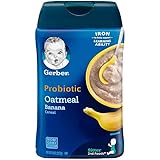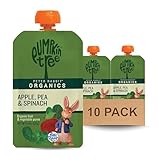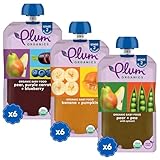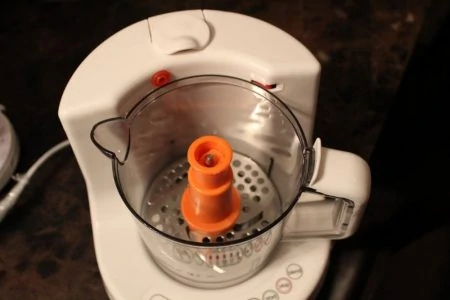Choosing your baby’s first foods is a massive milestone, and the options on the shelf can be overwhelming. If you’re leaning toward high-quality organic baby food to keep chemicals off the menu, you are in the right place.
We will break down what “organic” actually means on a label and why it might be the right choice for your family.
I’ll also share the top organic baby foods I’ve discovered while hunting for healthier options for my own little one. These picks are based on taste, ingredient purity, cost, and convenience. Plus, they have glowing reviews from thousands of other parents and babies who rely on them daily.
Keep synthetic pesticides out of your little one’s diet and support sustainable farming practices by filling your pantry with these tasty organic options.
- Gentle on immature stomachs
- Works well with other foods
- No added salt or sweeteners
- Lots of flavor options
- Gluten-free and kosher
- Convenient pouches
- Various temperature serving options
- Easy to consume
- BPA-free packaging
- Dissolves quickly
- Helps with teething pain
- Encourages self-feeding
- Pediatrician recommended
- Ideal first solid starter
- Easily digestible
- Exciting flavor combinations
- Easy to squeeze onto a spoon
- Unsweetened, unsalted, kosher, non-GMO
- Similar formula to breast milk
- Sourced from organic-compliant farmers
- Includes both lutein & prebiotics
- Promotes digestive health & learning ability
- No artificial flavors or sweeteners
- Non-GMO
- Certified USDA organic
- Made with U.S.-grown pumpkins
- Fully resealable
What Makes a Product Organic?
Farms with organic certification go through a strict licensing process to prove their standards (1). Organic produce used in baby food must be grown without synthetic fertilizers. While farmers can use some natural bug deterrents, chemical-based pesticides are strictly banned (2).
Labels can be tricky, so here are the three categories you need to know.
- 100% organic: Every single ingredient in the package was cultivated organically.
- Organic: At least 95% of the ingredients are organically grown.
- Made with organic ingredients: The product contains at least 70% organic ingredients. The remaining 30% are still highly regulated and cannot contain GMOs.
While this guide focuses heavily on produce, meat can be organic too. For organic meat, animals must eat organic feed, live in specific conditions, and cannot receive preventative antibiotics (3).
Why Choose Organic Baby Foods?
Here are the main reasons parents decide to make the switch to organic.
Product Reviews
I have researched and tested the top options to bring you these 10 great organic baby foods.
Baby Cereals
Earth’s Best Organic Rice Cereal
Best First Cereal
Earth’s Best has been a staple in the baby food aisle for over 30 years. They are a trusted name with an established organic line. I appreciate that their ingredients are all-natural and formulated to support infant growth.
This rice cereal is made with whole grains and is fortified with iron. Since babies deplete their natural iron stores around six months, this fortification is crucial. Rice cereal is a classic “first food” because it is incredibly easy to digest and has a mild flavor.
You won’t find artificial dyes, preservatives, or flavors here. It is certified organic, GMO-free, and has a smooth texture that mixes easily with liquids or fruit purees without clumping.
Pros
- Gentle on immature digestive systems.
- Neutral taste makes it easy to introduce.
- No added salt or sweeteners.
Cons
- Short shelf life due to lack of preservatives; use within 30 days.
Our Ratings
Gerber Organic Single-Grain Oatmeal Cereal
Best Fortified Cereal
Gerber is synonymous with baby food. While they make conventional products, their organic line is impressive. This single-grain oatmeal is a fantastic alternative if you want to avoid rice-based cereals due to heavy metal concerns.
It is fortified with a blend of vitamins essential for growth. Iron supports brain development, while Vitamin A aids vision and immune health. It also includes Zinc, Calcium, Vitamin E, and six B vitamins.
I love that it is completely non-GMO. Since it is oatmeal-based, it offers a slightly nuttier taste and more texture than rice cereal, making it a great “step two” for established eaters. It thickens purees well and babies generally enjoy the flavor profile.
Pros
- Hearty enough to keep babies full longer.
- Easy to digest fiber source.
- Mixes well with fruit for added flavor.
Cons
- The spout is wide, which can lead to accidental spills when pouring.
Our Ratings
Gerber Baby Cereal Probiotic
Best Probiotic Cereal
This oatmeal and banana blend takes nutrition a step further by adding probiotics. It’s a non-GMO recipe featuring real fruit and 11 grams of whole grains per serving, plus that essential iron.
Probiotics are excellent for supporting a developing gut biome and immune system. If your baby has minor tummy troubles or you just want to support their digestion, this is a smart pick.
The inclusion of real banana adds natural sweetness without refined sugars, introducing your baby to fruit flavors gently. It helps expand their palate beyond plain grains. It’s also thick enough to help babies practice spoon-feeding mechanics with less dripping and mess.
Pros
- Supports digestive health with probiotics.
- Real fruit adds natural flavor.
- No artificial sweeteners or flavors.
- Non-GMO certified.
Cons
- Banana content may stain bibs and bowls if left to dry.
Our Ratings
Purees
Mama Bear Organic Baby Food
Best Kosher Food
Amazon’s brand, Mama Bear, offers a surprising amount of value. This food is USDA organic, non-GMO, gluten-free, and kosher. It is a stage two puree, meaning it’s a bit thicker and perfect for babies around 6 months old. The pumpkin, apple, peach, and buckwheat blend is a hearty meal option.
The brand focuses on clean ingredients without artificial colors or flavors. It is a convenient way to ensure your baby gets nutrient-dense meals without the prep time.
Many working parents find these pouches to be a lifesaver. They offer the peace of mind of organic ingredients with the grab-and-go convenience needed for busy mornings.
Pros
- Wide variety of flavor blends.
- Kosher and gluten-free.
- No added salt.
- Budget-friendly organic option.
Cons
- Consistency can be on the watery side.
- Pouches are prone to leaking if squeezed too hard.
Our Ratings
Happy Baby Organic Variety Pack
Best Stage Two Baby Puree
Variety is key to preventing picky eating later in life. This pack is excellent for stage two eaters and includes four interesting flavor combinations to broaden your baby’s palate:
- Pear, squash, and blackberry.
- Apple, kale, and avocado.
- Apple, guava, and beet.
- Pear, kale, and spinach.
These pouches are lifesavers for diaper bags, coffee dates, or car rides.
Happy Baby is transparent about their recipes. You can read the exact ingredient breakdown on the back, and the packaging features a clear window so you can see the food inside before serving. The fruit effectively masks the taste of the greens, making it easier to get kale and spinach into a skeptical baby’s diet.
Pros
- Four distinct flavor profiles.
- Encourages self-feeding.
- Clear window on packaging to check for quality.
Cons
- Nutritional percentages are not always listed explicitly.
- Caps are not recyclable in all areas.
Our Ratings
Food Pouches
Peter Rabbit Organics
Best Pouch for Sneaking in Extra Greens
This apple, pea, and spinach blend is a clever way to boost vegetable intake. The natural sweetness of the apple completely hides the taste of the peas and spinach, making it a hit with picky eaters.
Peter Rabbit Organics is certified 100% organic with BPA-free packaging. They don’t use diluted ingredients; you get whole foods without hidden fillers.
Because they don’t add water, the puree is thicker than many competitors. This means you are paying for food, not water, and each 4.4-ounce pouch is a filling snack. The pouches are shelf-stable until opened, but must be refrigerated and eaten quickly once the seal is broken.
Pros
- No added water for a nutrient-dense snack.
- Can be eaten at room temperature or chilled.
- Convenient for direct consumption.
Cons
- Thicker texture might be surprising to babies used to watery purees.
Our Ratings
Plum Organic Baby Food
Best Fruit and Vegetable Medley Variety Pack
Plum Organics offers adventurous blends that go beyond basic applesauce. They utilize ingredients that are often skipped in baby food aisles, giving your child a unique tasting experience.
Every ingredient is organic, unsweetened, and unsalted. They are also kosher and non-GMO. The BPA-free pouches are resealable, which is great if your little one doesn’t finish the whole serving in one sitting (just toss it after 24 hours).
While some exotic ingredients are sourced internationally, the purees are made in the US. The packaging is designed to roll up from the bottom, helping you squeeze out every last drop and reduce waste. These are a diaper bag essential.
Pros
- Unique and sophisticated flavor combos.
- Easy to dispense onto a spoon.
- Resealable cap reduces waste.
Cons
- Natural separation occurs; needs thorough kneading before opening.
Our Ratings
Happy Baby Organic Baby Food
Best Resealable Pouch
Pumpkin is a nutritional powerhouse often ignored in baby diets. In this Happy Baby pouch, pumpkin takes center stage, balanced perfectly with carrot and apple for a sweet and savory mix.
Certified USDA organic, this pouch contains no added sugars, artificial flavors, or preservatives. It is also gluten-free and kosher. Pumpkin is rich in antioxidants, Vitamin A, and Vitamin C, making this a great immune-boosting snack.
I love the fully resealable cap. If my toddler gets distracted halfway through, I can store it in the fridge without a mess. Remember not to microwave the pouch directly; always pour the food into a bowl if you want to warm it up.
Pros
- Clear packaging lets you verify the food’s color and texture.
- Uses U.S.-grown pumpkins from family farms.
- High vitamin content.
Cons
- Sold in single-flavor packs rather than variety boxes.
Our Ratings
Baby Formulas & Snacks
Happy Baby Teething Wafers
Best Organic Snack
When your baby starts teething or showing interest in holding food, these wafers are a fantastic first snack. The Blueberry and Purple Carrot flavor is made with jasmine rice flour and organic fruits and veggies.
They are designed to dissolve easily, making them a low-risk option for babies learning to chew. They are gentle on sore gums and help babies practice hand-to-mouth coordination without the mess of a puree.
These are technically stage one snacks, suitable for sitting babies. They dissolve quickly enough that choking risks are minimized, though you should always supervise your baby while they eat.
Pros
- Dissolves rapidly in the mouth.
- Minimal mess compared to other snacks.
- Soothing for teething gums.
- Great for pincer grasp practice.
Cons
- Very fragile; they often break inside the box during shipping.
- Contains a small amount of salt.
Our Ratings
Earth’s Best Organic Dairy Formula
Best Organic Dairy Formula
If you need a formula that mimics breast milk without the synthetic additives, Earth’s Best is a strong contender. It skips the corn syrup solids and focuses on organic lactose. It includes DHA and ARA, fatty acids found in breast milk, to support brain and eye development.
It is USDA organic, kosher, and free from artificial growth hormones, steroids, and antibiotics. It also includes lutein for eye health and prebiotics for immunity.
This is an iron-fortified infant formula suitable for the first year. While safe for older babies, you might switch to a toddler-specific drink after their first birthday. It mixes fairly well, though organic formulas can sometimes be foamier than conventional ones.
Pros
- Modeled after breast milk for easier transition.
- Dairy sourced from organic-compliant farms.
- No corn syrup solids.
Cons
- Can cause constipation or gas in sensitive babies (common with any formula switch).
Our Ratings
What to Consider When Buying Organic Baby Foods
Let’s be real: budget matters. Organic food is generally more expensive because farming yields are smaller and production costs are higher.
If you can’t buy everything organic, don’t stress. Focus your budget on the foods that typically retain the most pesticides. These are known as “the dirty dozen” (8).
- Apples.
- Kale.
- Lettuce.
- Imported grapes.
- Carrots.
- Pears.
- Bell peppers.
- Celery.
- Nectarines.
- Peaches.
- Strawberries.
- Cherries.
To save money, skip the pre-packaged processed organic snacks which often contain added sugars and fillers anyway. Instead, buy conventional versions of produce with thick, inedible skins. The outer layer protects the fruit inside from most pesticides.
Here is “the clean 15”, produce with the lowest pesticide loads (9).
- Avocados.
- Corn.
- Pineapple.
- Mangoes.
- Onions.
- Sweet potatoes.
- Asparagus.
- Sweet peas.
- Kiwis.
- Cantaloupes.
- Tomatoes.
- Cabbage.
- Eggplants.
- Grapefruit.
- Watermelon.
Regardless of what you buy, wash your produce thoroughly. A simple vinegar and water soak can help remove surface dirt and contaminants.
The Heavy Metal Reality
It is important to know that “organic” refers to farming practices, not the soil’s natural heavy metal content. Heavy metals like arsenic, lead, and cadmium are naturally occurring in the earth and can be absorbed by roots.
Root vegetables (like sweet potatoes and carrots) and rice are more prone to absorbing these elements. To minimize risk, offer a wide variety of foods rather than relying on a single type (like rice cereal) for every meal.


















